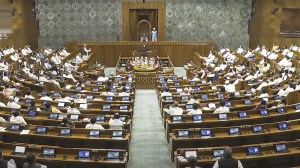HC strikes down Haryana’s bonus marks policy for govt jobs as unconstitutional
Orders revised merit list based only on exam scores; applies ‘no fault’ priniciple to protect candidates already appointed under the policy
 The policy in question allowed candidates to earn up to 10 extra marks — five for not having any family member in government service, and additional five marks for being widowed, having a deceased father, or belonging to specific tribes
The policy in question allowed candidates to earn up to 10 extra marks — five for not having any family member in government service, and additional five marks for being widowed, having a deceased father, or belonging to specific tribesIn a major setback for Haryana’s recruitment policy, the Punjab and Haryana High Court has struck down the state’s 2019 notification that awarded 10 bonus marks to certain candidates in government job selections based on socio-economic criteria, holding it to be in violation of Constitutional guarantees of equality and merit.
A division bench of Justices Sanjeev Prakash Sharma and Meenakshi I Mehta, which quashed the state’s notification dated June 11, 2019, held that the bonus marks criteria breached Articles 14, 15, and 16 of the Constitution, which guarantee equal treatment in public employment.
The ruling came on Thursday (May 22), but was uploaded on Friday.
The policy in question allowed candidates to earn up to 10 extra marks — five for not having any family member in government service, and additional five marks for being widowed, having a deceased father, or belonging to specific tribes. The court found this system discriminatory and a violation of merit-based selection principles.
“By carving out an artificial class of applicants, who would be entitled to five bonus marks, the principles enshrined under Article 16 would stand violated. No other reservation, except the one as available under Article 15 and 16 of the Constitution, can be laid down by any State,” the court said.
Citing Indira Sawhney vs the Union of India, the bench held that once reservation has already been provided statutorily ‟under the EWS category, as well as on account of social backwardness by providing reservation for backward class, further granting benefit under socio-economic criteria would lead to breach of 50 per cent ceiling limit”. The bench said that ‟what cannot be done directly cannot be done indirectly”.
The court order came on petitions filed by government job aspirants including Neeraj and Deepak, who argued that the bonus marks unfairly pushed less qualified candidates ahead of those with higher written exam scores. The court agreed: “If the bonus marks are deleted from the selection process, the meritorious candidates would have been selected. Such a selection (bonus marks)…would be in violation of the principles of equality as enshrined under Article 14 of the Constitution of India.”
The judgment also cited a 2024 precedent — Sukriti Malik vs. State of Haryana — where similar bonus marks had been struck down by the high court. That ruling was upheld by the Supreme Court.
The state had defended its policy as a way to promote social justice, citing the Latin maxim salus populi est suprema lex (the welfare of the people is the supreme law). But the court rejected this justification: “Any process of appeasing the people on the principle of salus populi est suprema lex stands vitiated on the anvil of Article 14.” The judges also noted the absence of any legal backing or data to support the policy, calling the selection process “wholly slipshod.”
In a move to protect candidates already appointed under the flawed system, the court applied the “no fault” principle. “We apply the theory of ‘no fault’ with regard to the candidates who would be ousted from the merit list although they had cleared the written examination and have been working for quite a long time now,” the court said. It allowed these candidates to continue in service but without seniority.
The court ordered the government to issue a revised merit list within three months, based solely on written exam scores. Those already appointed but who do not make the new list will be retained on an ad hoc basis until fresh vacancies arise. Newly inducted candidates will receive seniority and salary benefits from the original appointment dates of their counterparts.
The petitioners were represented by Advocates Sarthak Gupta and R S Malik among others.












